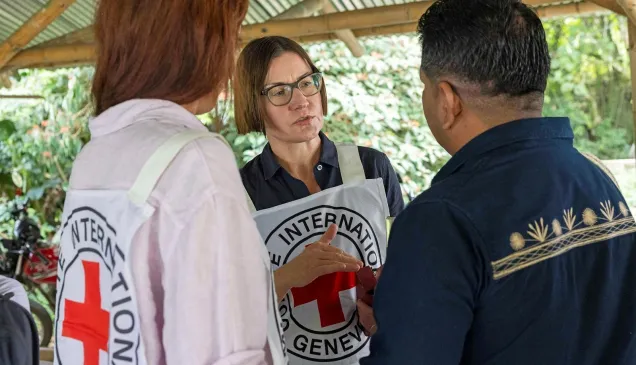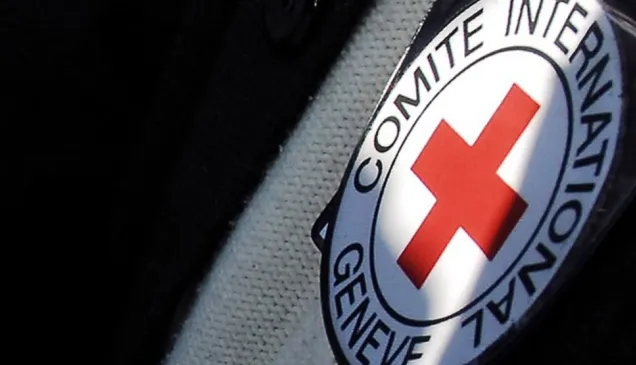Innovation in international humanitarian law dissemination
What have we learnt over the past decades about the dissemination of international humanitarian law (IHL)? And what kind of innovations have the potential to make dissemination efforts more effective in the future? These and related questions were the focus of a panel discussion hosted by the ICRC on 24 March at the Humanitarium, accompanying the 28th edition of the Jean-Pictet Competition. The event was part of the ICRC’s Conference Cycle on "Generating Respect for the Law".
Introduction
- Etienne Kuster, Advisor for Academic Relations, ICRC
Moderator
- Christopher M. Rassi, Senior Executive Officer, International Federation of Red Cross and Red Crescent Societies
Panelists
-
Vincent Bernard, Editor in Chief of the International Review of the Red Cross and Head of the Law and Policy Forum, ICRC
-
Chad Austin, Professor of Law at the United States Air Force Academy
-
Julia Grignon, Professor of International Law, Laval University
Dissemination of IHL has in many ways been a success. Never have there been more people trained in the law of armed conflict, and many countries have integrated IHL into their national legislation, law school curricula and military training. In addition, the law itself has progressed, with new treaties being adopted and ratified. And yet, we still often witness blatant violations of the law. So what more is needed? On the occasion of the 28th edition of the Jean-Pictet Competition, the ICRC invited a number of experts to take stock of the lessons learnt in the field of IHL dissemination and to review innovative approaches to address today's challenges.
Dissemination is not enough
Vincent Bernard, Editor in Chief of the International Review of the Red Cross (IRRC) was the first speaker of the panel. While acknowledging the significant progress made in the field of IHL dissemination, Mr Bernard clearly emphasized that making the law known is not sufficient. Many IHL violations are not committed out of ignorance of the law, but because parties to the conflict choose not to respect it. In his view, what is needed to address this problem is the creation of an environment conducive to the respect for IHL, consisting of several building blocks including sanctions, national legislations, and new monitoring mechanisms.
Vincent Bernard also stressed the need to create a unity of purpose. Given the growing number of actors involved in IHL dissemination and promotion, closer collaboration and coordination is paramount.
Dissemination also needs to harness the digital evolution. To illustrate the ICRC’s efforts in this regard, Mr Bernard presented the latest virtual reality tools, allowing trainers to bridge the gap between knowledge of the law and practical training for the field. The Editor in Chief of the IRRC concluded by reminding the audience that despite these technological advances, political will remains crucial. The upcoming World Humanitarian Summit (WHS) in Istanbul will perhaps provide an opportunity to bring IHL compliance to the attention of world leaders.
Modern IHL education involves more than just knowing the rules
Chad Austin, Professor of Law at the United States Air Force Academy, followed next and specifically looked at the integration of IHL into military education. For Mr Austin, modern IHL education in the military involves more than just knowing the rules. It is delivered through scenario-based computer simulations requiring not only knowledge but also judgment, making it far more experiential than in the past. The greater sophistication in the military’s ability to simulate the fog and stress of war has undoubtedly played an important role in this development.
Most importantly, effective IHL integration must focus on leadership and on the phenomenon of the barracks culture. Soldiers often learn from their senior leaders, and it is the latter who can set a cultural tone in the barracks that fosters the internalization of IHL values. But to create this culture, clear communication is key, according to Mr Austin. It is often in situations where there is a lack of clear communication about the soldiers’ mission that IHL violations occur. By practising discipline and respect for rules, effective military training can ingrain these qualities as part of a soldier's character.
Keeping academic teaching grounded in reality
The final presentation was delivered by Julia Grignon, Professor of International Law at Laval University. She began by outlining some of the key challenges professors face when they want to teach IHL in universities. In addition to the difficulty of obtaining a teaching mandate for IHL in the first place, it is also a real challenge to teach IHL in a realistic way. Teaching IHL should not stop at informing students about the theoretical provisions of the law, but should also focus on its practical applications – that is, explaining how the law is applied in the field and studying real cases. In this regard, the ICRC’s casebook “How does law protect in war?” serves as an excellent resource for any professor.
Another way to keep IHL grounded in reality is through organizing student competitions such as the Jean-Pictet Competition, which has found equivalents in countries like Tanzania, Ukraine, the Philippines, and the US. These competitions provide an exceptional training platform for the professionalization of this field of study. Many former participants have later joined government agencies, the armed forces, or the ICRC; and have thus played an active role in the application and dissemination of the law.
To conclude, the speakers left no doubt that IHL dissemination has come a long way and a lot of progress has been made over the past years. Yet many challenges remain. As was pointed out in the discussion, dissemination alone is not enough. Greater political will to develop new mechanisms to monitor the respect for the law is needed as well. On another level, it is important to continue to study the ways in which we can better influence weapons bearers and decision-makers. Within this framework, the ICRC is currently updating the Roots of Behaviour in War study which examines the factors influencing armed forces and groups not to commit atrocities in situations of conflict around the world.



